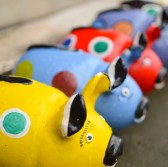
Virtual Money Fair
Please select the virtual money fair page for your desired province below. (Note: we’ll be adding every province in the coming days, so check back soon if yours isn’t listed yet)
Close this Window
Please select the virtual money fair page for your desired province below. (Note: we’ll be adding every province in the coming days, so check back soon if yours isn’t listed yet)
Close this Window

 Back to Resources
Back to Resources
 Print
Print
Subject Area: Drama
The class will perform a variety of scenarios about a teen who wants to buy a trendy pair of designer jeans. In small groups, the students create the dialogues for their presentations, making up possible conversations that may occur between the teen and their family members. After each performance the class will talk about what happened, discussing what made good financial sense and how changing the dialogues and the reactions of the people involved could have produced a different ending (e.g., what was said that was helpful, what was said that influenced the outcome, etc.)
1–2 periods
Two copies of the scenarios handout, and, if available, some props for the performances.
Scenario 1
Write a dialogue between a teen and their parents. The teen is asking for money for a new pair of trendy designer jeans that cost $99. The parents say that they cannot afford it and tells the teen they have enough jeans anyway. The teen yells angrily at the parents telling them they never understand the necessity to have the newest clothes; the teen stomps out of the room. The little brother hears the yelling and starts to cry. The mother is frustrated and says that the teen thinks they are so hard done by and just doesn’t understand the family finances. The father says that their teen is too concerned about image and “Keeping up with the Joneses.” The father shakes his head and tells the mother that he just doesn’t understand teenagers.
Scenario 2
Write a dialogue between a teen, an older sibling and their parents. The teen is asking for money for a new pair of trendy designer jeans that cost $99. The parents say that $99 is a lot to pay for jeans. The older sibling bought a pair with their own money, and says that they are so cool. The teen says that they really want the jeans and is willing to pay half from their own savings. The parents still try to convince the teen that the jeans are too expensive. The older sibling speaks up and suggests taking the teen shopping to see if they can find a sale. The parents like the idea, and, if they cannot find a better price, they, the parents, will pay half of the cost.
Scenario 3
Write a dialogue between a teen and their parents. The teen is asking for money for a new pair of trendy designer jeans that cost $99. The parents walk in holding the hand of their teen’s younger sibling. They say that money doesn’t come easily and that the jeans cost a lot of money. They suggest the teen must earn the money. The teen suggests doing extra chores around the house to earn the money. The parents suggest that baby-sitting the younger sibling on Saturday night would be a good start to earning some extra money. The teen agrees and they sit down to decide on other chores that could be taken on to make money.
Scenario 4
Write a dialogue between a teen and their parents. The teen received some money as a birthday present from the grandparents. In walks an older sibling. The teen tells them that they want to buy a new trendy pair of jeans that cost $99. The older sibling tells them that they just earned $25 by doing nothing! The teen asks how the older sibling made money without doing anything. The older sibling says, it was easy, the money in my bank account earned me $25 in interest. The older sibling says that there is a sale on at the mall and offers to take the teen to get the jeans. The teen says great, but don’t take me to the store, I think I would like to go to the bank instead and deposit my birthday money into my bank account. I would like to earn money for doing nothing too! The older sibling gives the teen a high-five!
Related Resources
The class is told that a family has just inherited $6,000. The students will be divided into groups and each group will be given different perspectives of what the family members want to do with the inheritance.
Read More
Students will appreciate different points of view regarding their needs and wants. They will view how teens interact with parents and how to make choices.
Read More
Many students are passionate about music but they may not have enough talent to think about a possible career in the music industry.
Read More
The class will brainstorm ways to save money around the house. Each student will be asked to complete a diorama of a room in their house, showing ways that they can save money by saving on energy costs.
Read More
The class will discuss the meaning of several money concepts. Then they will expand their understanding of these concepts by performing in small groups, a money song based on a familiar tune.
Read More
The class will discuss the selections offered in restaurant menus. They will talk about how a menu is designed to whet your appetite and encourage you to spend your money.
Read More
The class will be asked to think about why families might need to make a budget and what kinds of expenses a household has monthly.
Read More
In groups the class will look at a variety of food ads and discuss how the company is trying to convince people to buy their product.
Read More
After reading an article about the importance of healthy food choices the class will be divided into groups to plan a week’s menu.
Read More
The students will think about the positive and negative affects money has on society.
Read More
The students will create a “mind map” of the cost of running a household and present their ideas to the class.
Read More
Students will see the values in comparison shopping to find the best prices and save money.
Read More
After a discussion about how companies try to entice buyers through effective advertising, the students will be asked to create a radio ad or newspaper ad for a new product.
Read More
The class will learn about two early companies in Canada by reading about the start up of the North West Company and the Hudson’s Bay Company. Then they will take a quiz to see if they have the personality to be a good entrepreneur.
Read More
Working in groups, the students will simulate the experience of establishing a farm in Canada as a way of learning about the factors that affect the pricing of commodities.
Read More
After a discussion about how to shop for the best deals, the students will complete a worksheet that determines the unit prices for various items. The teacher will lead a discussion by taking up the answers. The students will mark each other’s papers.
Read More
This lesson will have the students examine strategies that advertising uses in an attempt to create a desire for a product. The students will be asked to select ads and explain what strategy they use to create appeal and how effective they are in accomplishing their aim.
Read More
Students will discover ways to invest money and understand the risks and rewards of each kind of investment.
Read More
Often children spend money without regard for how much of their money and how their choices affect themselves and others. In order to be a financially responsible adult they need to develop an awareness of their spending habits and whether or not their habits need to be modified to ensure that they have proper priorities. Developing wise approaches to money now will provide them with a stable future.
Read More
The students will look at several famous quotes about money. They will discuss the quotes in groups and share their interpretations of the money messages that are suggested in each quote.
Read More
The class will read an article about Peer Pressure, either on the internet or by using the handout provided. Then they will break into groups to discuss the potential effects of peer pressure. The period ends with a recap of what was discussed and learned about Peer Pressure.
Read More
In this activity, students will come up with their own personal values and determine how money relates to these values. They will also decorate a “value themed” piggy bank.
Read More
In pairs or on their own, students will brainstorm how to make a nutritious lunch for $3.00. They will complete a supermarket shopping list of the items they will need.
Read More
The students will pretend they are a new company building a factory.
Read More
The students will use the Internet to read about how to be a smart shopper. These articles teach teens how to spend wisely and save money. After reading and taking notes they will share what they learned with the class.
Read More
In groups, the students will brainstorm the ways that people impact the environment by using energy. They will access a program on the Internet to learn how they personally can save money by saving energy, and read some facts such as how much money the average household spends on energy.
Read More
The students will discuss with their families ways to save money by reducing, reusing and recycling.
Read More
The students will discuss the differences between needs and wants in the context of early fur trade between First Nations and Europe.
Read More
Students will simulate a limited home energy audit to see where costs can be lowered as a way of learning about the costs of owning a house.
Read MoreAfter a brief class discussion about why some jobs are higher paying than others, the students will read an article called “Why Do Some People Make More Money Than Others?” Then they will complete a research assignment about possible future careers that they may be interested in pursuing.
Read More
The students will learn about different methods people can use to pay for their purchases or their bills – such as cash, credit cards, debit cards, store cards, cheques, and electronic funds transfers. Using a jigsaw activity, each group will research one kind of payment, considering its pros and cons. The “experts” will then share with the other jigsaw groups.
Read More
The students will play a game on the Internet called “Math at the Mall.” This real life simulation game will give the students practice solving a variety of problems.
Read More
The students will discuss the aspects of a Decision Making model.
Read More
The students will brainstorm the factors that influence people when making a decision.
Read More
The activity involves reading and completing an Internet brochure called “A Kids Guide to Money.”
Read More
The class will discuss currencies used in countries around the world and the geographic reasons why some countries make good tourist destinations. In pairs, the students will complete a research assignment that looks at currencies and land features of countries that make it a popular place to visit. They will produce a travel brochure to share with the class.
Read More
The Talk with our Kids About Money Day program is expanding internationally. For more information, or to request the program be implemented in your country, please contact us.

By registering, educators will be able to access the resources, lesson plans for their specific province, and the Teacher’s Guide.
Let us help you make the most of the resources on the site. By sharing some basic information, you will be linked to resources that best meet your needs.

Let us help you and your family make the most of the resources on the site. By sharing some basic information, you will be linked to resources that fit the ages and interests of your children.
Note: You do not need to register to access the resources. However, we would appreciate it if you do register since we would like to have a sense of the numbers of people participating. We will also send news and info periodically to those who register.
Enter your email address. A reset link will be sent to you.


